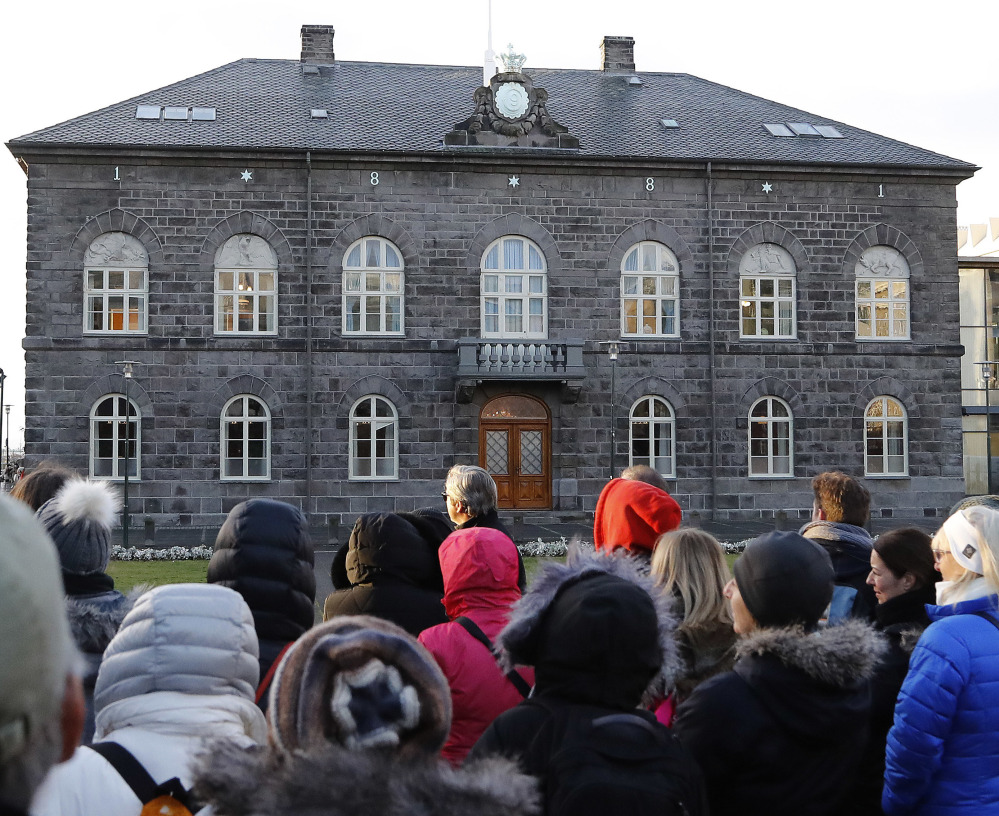Iceland may be a popular stopover destination for travelers flying to the U.S., but when it comes to the gender pay gap, it’s worlds away.
Whereas American women were paid 18 percent less than their male colleagues doing similar work in 2013, according to the last comparable study, the “unexplained pay gap” was just 5.7 percent in Iceland – and it’s about to shrink further.
A new Iceland law that took effect Monday is designed to publicly shame companies seen as discriminating against women in terms of pay. Companies with more than 25 employees now have to obtain government certification that female employees are paid the same as men for similar work. The law comes after previous legislation prohibiting discrimination by employers failed to close the pay gap – although it has declined by over 2 percentage points since 2008.
Potential job applicants could check to see if a company is certified before applying, and uncertified businesses could be exposed in the news media or on social media.
DOING SOMETHING ‘RADICAL’
U.S. Sen. Bernie Sanders took to Facebook this week to demand the introduction of a similar mechanism in the U.S.
“We must follow the example of our brothers and sisters in Iceland and demand equal pay for equal work now, regardless of gender, ethnicity, sexuality or nationality,” Sanders wrote. “As we fight back Republican efforts to revert women’s rights to second class, it is important to not lose sight that our real goal is to move forward and expand women’s rights.”
Iceland’s then-social affairs minister, Thorsteinn Viglundsson, sounded similarly excited when the law was proposed early last year. “The time is right to do something radical about this issue,” Viglundsson told the Associated Press at the time.
But how much of a role model is Iceland’s latest attempt to eradicate the gender pay gap?
While the measures may be unprecedented, they probably won’t be a silver bullet.
Passed by parliament last summer, the new law had been in the works for several years. Researchers created a complicated model to make salaries comparable, even if official job requirements or work schedules differ on paper. Governmental auditors will examine all companies with more than 25 employees over the next four years, even though it remains unclear whether companies that fail to obtain the certification – known as “Jafnlaunavottun” – will face any sanctions, aside from public opprobrium.
Rather than outlawing gender pay gaps, the new law is conceived as a mandatory and government-enforced version of other public shaming efforts already introduced in other countries.
OTHER FACTORS AFFECT WOMEN
Even if Iceland’s new law succeeds at closing or significantly narrowing the gender pay gap, critics have noted that other factors are still holding women back. For example, women are still far more likely to interrupt their careers to dedicate extra time to their families than men.
“(The) certification requirement might help root out the ‘unexplained gender pay gap,’ but is unlikely to reduce the larger ‘explainable pay gap’ (for example, due to differing working hours in paid work),” Stefán Ólafsson, a researcher with the University of Iceland, concluded in a summer 2017 report for the European Commission. In total, women still earn 22 percent less in Iceland than men. That number includes women working part time or not at all.
Mandatory child care leave for both men and women would be a more radical step, critics of existing legislation say, even in a country like Iceland that regularly tops equality rankings.
About four decades ago, women made gender equality a political priority in Iceland by going on strikes. Today, many of their former demands are considered to be self-evident, as schools offer Gender Studies classes that seek to make students more aware of everyday discrimination and prevailing stereotypes.
LEADER ON THE SIDE OF WOMEN
The country’s prime minister, Katrin Jakobsdottir, is an avowed feminist who has been pushing for tougher legislation since coming to power last November.
But Jakobsdottir’s government may be an outlier for a global movement that has recently suffered new setbacks. Since 2006, the World Economic Forum has tried to measure whether women are facing more or less inequality in the world. And last year, for the first time, it said that things were getting worse again.
The report’s authors concluded that fewer women were participating in the workforce than in previous years, and that salaries were growing less equal again. Whereas Iceland’s deadline for companies to comply with their regulations runs out in 2021, it will likely take more than two centuries to close the pay gap globally, the researchers calculated.
Send questions/comments to the editors.



Success. Please wait for the page to reload. If the page does not reload within 5 seconds, please refresh the page.
Enter your email and password to access comments.
Hi, to comment on stories you must . This profile is in addition to your subscription and website login.
Already have a commenting profile? .
Invalid username/password.
Please check your email to confirm and complete your registration.
Only subscribers are eligible to post comments. Please subscribe or login first for digital access. Here’s why.
Use the form below to reset your password. When you've submitted your account email, we will send an email with a reset code.